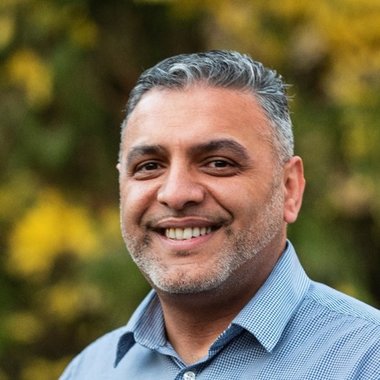10 August 2022
Dr Sarfraz Jeraj explains how the KHP PEACS project is aiming to improve outcomes for people experiencing chronic pain.
What is the PEACS project?
The Pain: Equality of care and support in the community (PEACS) project is a new care pathway being developed for people living with chronic pain in Lambeth and being piloted in the Stockwell Primary Care Network (PCN), a partnership of five GP surgeries. The pathway has been co-designed with a community design agency, Comuzi, which conducted detailed interviews with local residents experiencing chronic pain, their carers, and clinicians with an emphasis on listening to the experiences of people from Black communities. Accounting for these voices in the design was intended to minimise the impact of structural bias and inequalities in the foundation of the service.
The aim of the pilot service is to support chronic pain patients to self manage by working together in a series of workshops to develop a range of tools and build relationships with the voluntary sector.
Why do we need this project?
People from Black communities experience a higher prevalence of chronic pain, lower rates of access to care and poorer clinical outcomes compared to their fellow White patients. Data collected from various agencies points to consistent findings that a significant number of people experiencing chronic pain are not satisfied with their health care treatment, with a resulting impact on their lives and on health services. In response to these findings, Impact on Urban Health commissioned KHP’s Mind & Body Programme to co-develop and test a service aimed at improving outcomes for people experiencing chronic pain, with a focus on supporting and working with people from Black communities.
What are the notable features of this new service?
- Co-design – we have worked with our user design partner, residents, carers and clinicians to take a bottom-up approach to the development of the care pathway and are continuing to work with our Experts by Experience;
- Bio-psycho-social – the service takes an integrated, whole-person approach to supporting patients, aligning to lifestyle medicine pillars including: Physical activity, Healthy eating, Sleep, Mental wellbeing, and Healthy relationships;
- Proactive engagement – a link worker will work as part of the service to establish relationships with patients, increase accessibility (including through provision of in-person and online formats) and support effective utilisation of the service;
- Peer and professional learning – each workshop will be structured to offer space for participants to be heard, to share experiences and learn with and from each other, as well as benefitting from evidence-based guidelines and the multi-disciplinary clinical team;
- Voluntary care – voluntary care partners are being engaged to help co-facilitate and host some workshops, bringing the intervention into the community and serving as a bridge to enable patients to benefit from ongoing support from the local voluntary sector;
- Patient outcomes – following on the success of the Integrating Mental & Physical healthcare: Research, Training and Services (IMPARTS) tool to help identify and monitor mental health needs in people with physical health conditions, the PEACS project has developed a bespoke online questionnaire that places patient-reported outcomes at the centre of the service.
What’s next?
The pathway is in the final stages of the design phase and will be going live with patients from September 2022 with the first series of in-person and online groups expected to be held in December 2022. This will be an exciting time to implement our findings so far, learn what works and better understand how we can improve accessibility and outcomes for people living with chronic pain.
An independent organisation will be evaluating the project at the end of twelve months to establish whether this work can be expanded and offered to more people. We will provide updates as the project progresses.
Liked this article? Click here to discover how KHP Mind & Body is joining up mental and physical healthcare, training and research to improve health outcomes for our patients and service users





